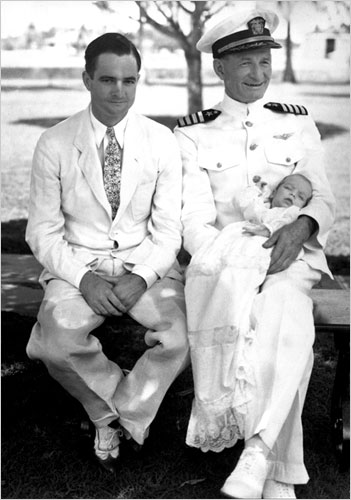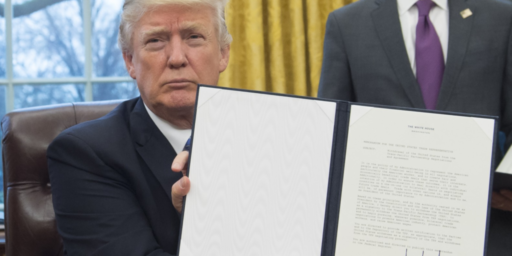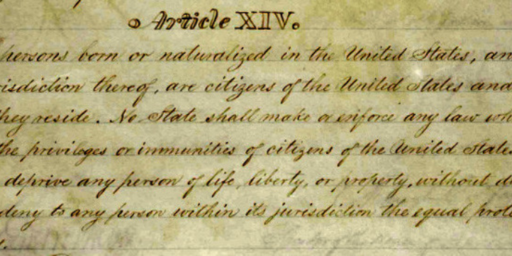John McCain’s Presidential Eligibility Redux
Gabe Chin, a University of Arizona law professor, has re-opened the “Is John McCain a natural-born citizen” debate with a new paper arguing that persons born in the Panama Canal Zone did not technically become automatic citizens until eleven months after his birth. Adam Liptak examines this closely in today’s NYT and gets a wide variety of legal opinions on Chin’s analysis.
What’s clear, though, is that the discussion is entirely academic.
“No court will get close to it, and everyone else is on board, so there’s a constitutional consensus, the merits of arguments such as this one aside,” said Peter J. Spiro, an authority on the law of citizenship at Temple University.
[…]
Daniel P. Tokaji, an election law expert at Ohio State University, agreed. “It is awfully unlikely that a federal court would say that an individual voter has standing,” he said. “It is questionable whether anyone would have standing to raise that claim. You’d have to think a federal court would look for every possible way to avoid deciding the issue.”
Miami lawprof Michael Froomkin agrees but adds,
Even so, it would be nice to think that the issue could get into court, but not to throw McCain out of the election, which would be a travesty. As Prof. Chin rightly says, “Presidential candidates who obtained their citizenship after birth are no more likely to be disloyal than those born citizens, and the People of the United States should be allowed to elect whomever they choose.” (Insert “shortly” before “after birth” if it makes you feel better.)
No, the reason to wish this would get into court is that it would provide a strong excuse for knocking the stuffing out of the largely pernicious Insular Cases which form the basis for the argument of McCain’s ineligibility. The Insular Cases are the basis for the argument — wrong in my opinion — that most of the Constitution stops at the water’s edge. I believe that the Constitution applies to the officials whose offices exist under it whereever they act. I don’t think non-US citizens abroad have constitutional rights like US citizens at home or abroad do, but I don’t think that government officials lose the shackles of law when they cross the border. Too often — think Guantanamo — our officials act as if they do, and their lawyers try to justify it in court.
Frankly, it might be time to simply fix the Constitution in the manner the Framers intended: by amendment. It’s wholly unclear to me why all of the restrictions on whom Americans may elect president (age, citizenship, number of years previously served) shouldn’t be swept away.







I agree completely. My understanding is that this clause of the Constitution:
[Section 1 of Article II]
was inserted because of the Framers fear that a “Tory” latecomer might become president and somehow undo the Revolution. I think we’re safely past that.
Just to be clear, the number of years served is a relatively recent addition to the list of restrictions.
Orrin Hatch did table an amendment in the Senate, I believe, which would’ve allowed a non-US born citizen to run for the presidency after 20 years of residency. It seems fair enough, and it’s a little silly that someone can be a governor of a major state (like Schwarzennegger) or US Secretary of State and de facto no. 2 in the government (like Kissinger) and not even be able to explore running for the presidency.
McCain should just say that he qualifies under the 2nd half. Such a joke might even be funny.
I did a computer search of SCOTUS decisions using the term “natural born Citizen” when this issue was first raised. It was pretty sparse. Clearly an invitation for judicial tomfoolery.
America needs to dial back its hair-trigger on Constitutional issues. If Ahrnold wants to run for President, yes he needs the Constitution changed, but on these vaguer issues we need to trust that the whole Constitutional system does a pretty good job of protecting our interests.
And that goes for that foreigner Obama too.
What we are Venezuela or Zimbabwe now? Changing our Presidential eligibility to suit the current political populism. The restrictions upon the eligibility for President are based on sound reasons.
Age is to ensure maturity and experience to handle such responsibilities.
Natural-born citizenship is to ensure that you have not owned allegiance to any other sovereign in your life. You can lose your eligibility to be President if you renounce your citizenship or serve in a foreign government or military. Both signs that you no longer hold the US constitution above all other sovereigns.
The term limit was imposed to prevent a populist dictator that many feared FDR was becoming and to prevent political maneuvering that would create overwhelming barriers to competitors. Think the drive to place term limits on Congress.
While there are those who meet the Presidential criteria who aren’t mature enough to handle the job or whose sole allegiance isn’t to the US Constitution, the limits serve a valid purpose and the election process is to handle bad candidates who meet the low threshold. Being the governor of a large state or being Secretary of State is not the same as being President. Neither officeholder has the final decision in matters that will turn the country over to a foreign sovereign. It may be antiquated and many may not put much stock in honor anymore but limiting Presidents to those who’ve never (overtly) had allegiance to any other sovereign isn’t such an onerous restriction.
Is that true? Art. II, Sec. 5 seems to only require citizenship at birth and residency for the past 14 years.
I’ve quoted you and linked to you here.